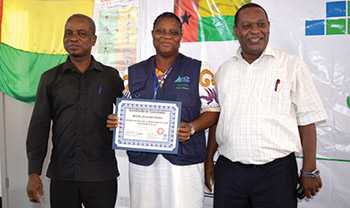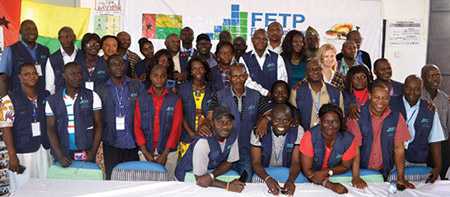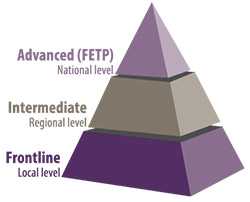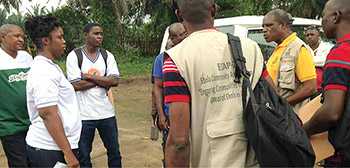FETP: Building Workforce Capabilities on the Frontline of Surveillance

As we witnessed with Ebola and other infectious disease outbreaks, a disease outbreak in a remote village or large metropolitan city, can spread, even within hours, across borders and threaten the health and security of other countries. It is important that every country has a well-trained public health workforce on the ground, prepared to quickly detect and respond to health threats and stop them close to their source.
For more than three decades, CDC has worked with ministries of health and other partners around the world to build local capacities and strengthen national public health workforce through flagship programs like the Field Epidemiology Training Program (FETP). FETP graduates in over 70 countries have responded to some of the world’s most urgent public health emergencies including Ebola in West Africa; MERS-CoV in the Middle East, South Korea and the Philippines; polio in Pakistan and Nigeria; Nipah virus in Bangladesh; acute encephalitis in India; and earthquake recovery in Haiti.

Modeled after CDC’s Epidemic Intelligence Service, FETP provides supervised, on-the job, competency-based training to develop field epidemiologists (disease detectives) at all levels of a country’s health system. FETPs focus on training through service and the program is deliberately designed to allow participants to learn important outbreak investigation and response skills while providing key services to their health organization. FETPs offer three levels of training—frontline, intermediate, and advanced, depending on the needs of a country’s public health system.
To expand workforce capabilities at the local level, DGHP’s Workforce Institute and Development Branch and home of FETP, launched FETP-Frontline in 2015 –a three-month training program focused on detecting and responding to diseases and events of public health importance or international concern. FETP-Frontline participants include government public health workers in charge of surveillance data collection, compilation, analysis, reporting, and response at the local level of the health system. FETP-Frontline trainees have two weeks of classroom sessions and 12 weeks of hands-on field experience in surveillance, monitoring and evaluation, and data analysis and interpretation for public health decision-making.
Impact of FETP-Frontline—More programs, more graduates, and more security

Within 16 months of establishing FETP-Frontline, 24 programs were launched in 24 countries, 22 of them identified as priority countries to advance global health security. More than 1,200 trainees graduated from new FETP-Frontline programs by the end of 2016. Efforts are underway to expand FETP-Frontline in 2017, and increase the focus on the Zika-affected countries in the Americas and Caribbean.
FETP-Frontline programs worldwide are making a remarkable impact in increasing and training frontline disease detectives better able to rapidly detect and respond to public health emergencies. These efforts contribute to an increased likelihood of controlling public health problems at their source and enhanced global health security.
FETP-Frontline trainees and graduates have actively participated in responses to cholera, measles, yellow fever, and other disease outbreaks, identifying suspected outbreaks early and raising standards for quality investigations. For instance, FETP-Frontline trainees from the Democratic Republic of Congo (DRC) participated in the investigation of a cholera outbreak after a suspected case was reported in Mbandaka. From August through September 2016, teams worked in three different locations and helped to rapidly identify the source of the outbreak and implement measures to control the spread of cholera in DRC.
Liberia: FETP-Frontline

Prior to the 2014 Ebola outbreak, which claimed thousands of lives in West Africa, Liberia, one of the countries most affected by Ebola, had few trained disease detectives. By the end of 2016, the country had a pool of 115 frontline disease detectives, enough to cover all 15 counties and 92 health districts in Liberia. The disease detectives were either still in training or had completed the three-month FETP-Frontline training course and were prepared to identify and report potential disease threats. At the close of 2016, nearly all graduates had participated in at least one outbreak investigation or response, including suspected Lassa Fever cases, measles outbreaks, and an Ebola cluster reported in March 2016. Plans are underway to launch the intermediate FETP course in 2017. The increased availability of trained disease detectives in Liberia makes this country more able to rapidly detect and respond to disease outbreaks, helping keep the world safe from possible global pandemics.
- Page last reviewed: March 24, 2017
- Page last updated: March 24, 2017
- Content source:


 ShareCompartir
ShareCompartir